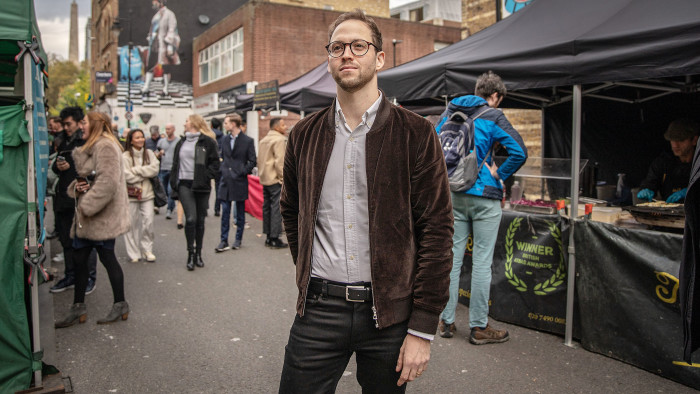From soldier to chef to MBA student

Roula Khalaf, Editor of the FT, selects her favourite stories in this weekly newsletter.
Omri Farber grew up in his father’s restaurants, and hopes to use his MBA at one of the companies reinventing the trade
Why Cass? Well, it was a gut feeling. When they looked at my CV, they did not say: “Oh, this is an issue because you have not been to university.” They said: “This is something we have not seen, and this is really interesting.”
In Israel, military service is mandatory, but I ended up doing six years. It was a different time then, I really felt like I could make a difference, and I think I did to an extent. It was also an amazing opportunity for self-development. The experiences I had between 18 and 24 were incomparable to those of most other people my age.
I served in the department of casualties and missing persons and my job was to communicate with the families. I got hooked on how I could help people who were going through probably the most difficult times of their lives. At the same time, I had to understand our entire operation and represent the military in very sensitive situations.
I progressed fairly quickly, slightly faster than I should have, probably. At 23, I was a captain. Soon I had to make a decision whether I wanted a full-blown military career, which I didn’t. I felt I had achieved what I wanted to do, and the political climate was changing. The outlook for peace became more complex.
Instead, I went back to an old passion. I was born the year my father opened his first restaurant and I was literally raised on its counter. My father was one of the early celebrity chefs in Israel — he had a lot of restaurants, books and TV shows. Because of that I have essentially been working in restaurants since I was about 12, running around kitchens tugging on aprons and asking to be taught.
I ended up moving to London to study at the Cordon Bleu. It was fantastic but very different, which required adjustment. If you come from working in restaurants, you think you know how to do things and then someone humbles you, saying “look, you need to learn how to dice”.
The course took a year and then I found the restaurant Lyle’s, which served the most exciting food I had in my life. It took weeks of pursuing the head chef, trying to convince him to give me a job. After a month, I had one.
It is a difficult industry, which was one of the drivers for me doing the MBA. My head chef was a great inspiration, but he was acclaimed, running his own Michelin star restaurant — he had everything — yet was still there every day, 7am to 2am, working nonstop.
For the people at Cass, my non-traditional background was a plus, or at least interesting enough for them to give me a shot. Another thing that convinced me to do my MBA at Cass was its relationship with the City of London. The speed at which you meet the right sorts of people from the industry is incredible. The school would host breakfast sessions with companies, have us visit firms interesting to us, or just put you in touch with the right people.
One of my dream companies sent a recruiter one day, and the careers team called me up and said “you want to meet this person”. That ended up being an hour-long interview, and I have another meeting with the company.
We were a class of just under 70 from many different backgrounds and countries. Obviously a lot of people from accounting and HR professions and a lot of finance people, but we also had the head of a logistics operation who worked across several African countries and a teacher.
We became dependent on each other, which is very similar to the camaraderie in the military. One of my classmates, who was an actuary, sat with me for a week helping me develop my financial projections.
It was a one-year course and one of my favourite classes was an international elective where we flew out to study digital innovation in Silicon Valley and marketing in Las Vegas. Another great class was a strategy module with Charles Baden-Fuller, who was one of the best professors I’ve met and a huge inspiration.
Right now, I am working at an Israeli automotive start-up of an old connection of mine, while I look for the big job. Longer-term, I’m looking to join one of the technology-focused companies that are the future of the restaurant industry, as the changing behaviour and preferences of customers are putting pressure on a sector that has remained largely the same since the dawn of the first modern restaurant a few hundred years ago.
Comments